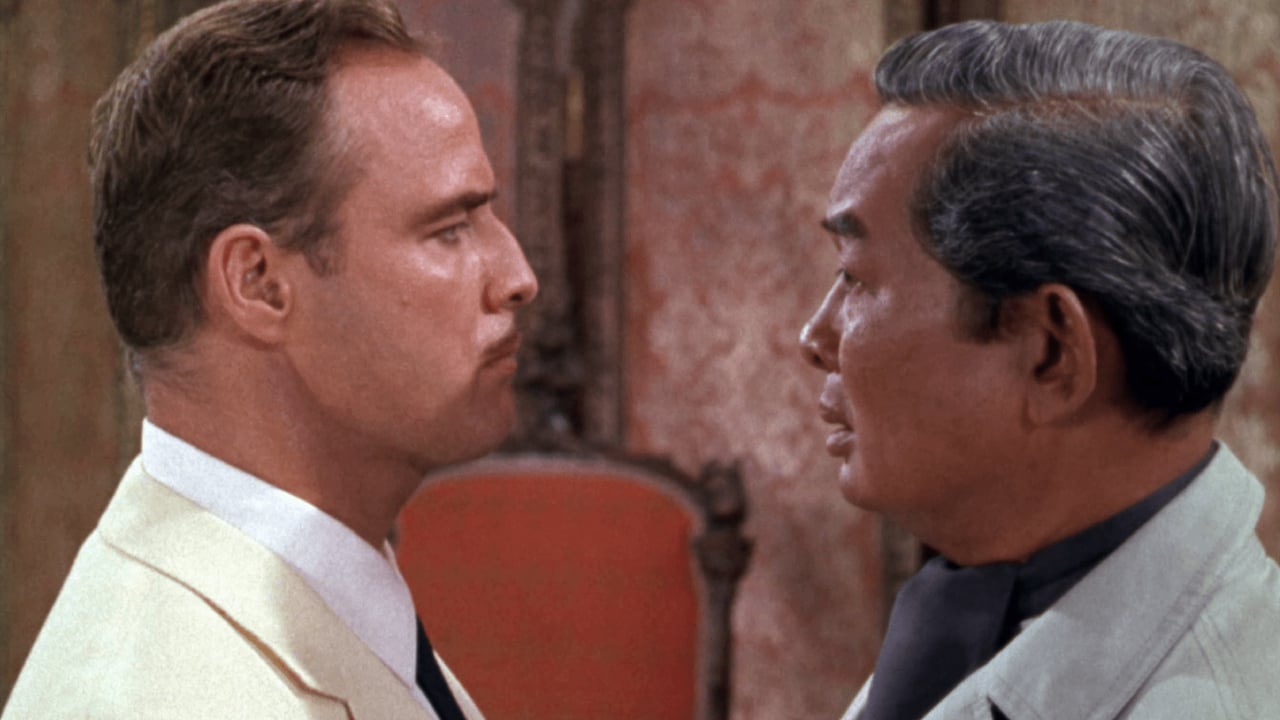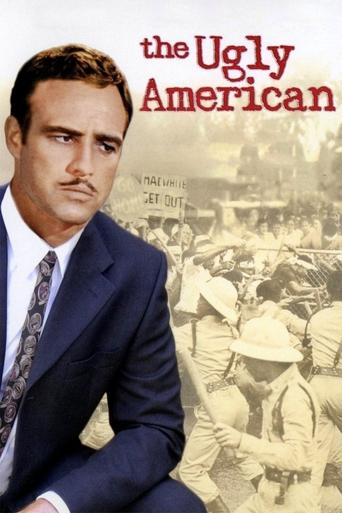

Good start, but then it gets ruined
... View MoreBlending excellent reporting and strong storytelling, this is a disturbing film truly stranger than fiction
... View MoreIt's an amazing and heartbreaking story.
... View MoreOk... Let's be honest. It cannot be the best movie but is quite enjoyable. The movie has the potential to develop a great plot for future movies
... View More"The Ugly American" has an interesting subject matter as its plot and something which might have interested Marlon Brando personally, politically speaking. The film piles on the glamour a bit too much at times as there should have been more of a hard edge to the story. There is some tension and excitement along the way but not enough, sadly. Brando does very well as the ambitious but somewhat ignorant ambassador.
... View MoreDespite "The Ugly American" being filmed in a fictional Southeast Asian nation, the parallels between this film and Vietnam in the 1960s are quite obvious. It's obviously NOT about this fictional place but is a commentary on the American government's reaction to nationalism and revolution. While this nation was founded as a haven for revolutionaries, by the time the film was made, the policies were generally reactionary--bolstering up ANY government that was seen as keeping the status quo so long as they weren't communists. Yet, like in the case of this fictional land, many revolutions had nothing to do with communism and SHOULD have been welcomed by the US but weren't.This film begins with Marlon Brando playing a new ambassador to the tiny nation of Sarkan. Some of the senators at his confirmation hearing were not impressed--Brand's character appeared to be a political liberal and looked favorably upon the nationalistic movement growing withing Sarkan. After all, the leader was his old and dear friend. However, after assuming the post, both the friend and Brando behave quite stupidly. They should have been friends but very soon become bitter enemies. Brando brands the ex-friend a communist and the friend rushes to the communist camp for assistance.My biggest problem with the film was its pacing. Brando goes from close friend to bitter enemy VERY quickly--too quickly. Things escalate wildly out of control in an interesting manner but it's all just too rushed to be realistic. But, aside from this, the acting is decent and the story quite compelling--especially the film's commentary on the apathetic American public. Clever and insightful, this one probably looks a lot better today in hindsight then it did back in 1963 before the Cold War in Southeast Asia really heated up significantly.
... View MoreThis film came out in 1963, just when the Kennedy/Johnson administration started to escalate the war in Vietnam. I am terribly dismayed and disappointed that the U.S government learned nothing from this movie.In the first place, it is utterly and unrealistic to muddle into the political affairs of a country with very different culture and political background. Secondly, while we in the western world deplore communism, it is very silly and idiotic to treat it as a contagious disease, to be repelled and avoided at all costs. With our wealth, freedom of expression and using an open-door policy, we can show the people in the Communist countries or countries about to go Communist that our system is better and in every way offers people more freedom, pleasure and security. I think this film should be shown whenever and wherever people come to see the Vietnam Monument in Washington
... View MoreYears ago, I loved reading "The Ugly American," so when I saw this film at the video store, I had high hopes. Unfortunately there is little similar between Lederer and Burdick's work and this cinematic dreck.The book is a story of the complexity of diplomacy, and of the multiple ways some people get it right and some people get it wrong, set it a fictional Indo-Chinese country.The total sum of the movie's attempt to represent complexity are people with different opinions about the state of affairs in the country. And in the end we find out exactly how they were all along. This is not complexity, this is not the ambiguity present in the wonderful book. The screenwriters have taken a plot about fundamental errors in approach, empathy, and understanding, and made it into a movie about people who have minor disagreements on the facts (and eventually are shown the 'correct' interpretation).The book follows a multitude of characters. The movie follows one character, a very hammy Brando, and barely even references anybody else as being significant.The ugly engineer from the book has a total of about 5 minutes screenplay in the movie! The sleazy, foolish newspaper man the same! These were CRITICAL and CRUCIAL characters in the book, and they are given barely a mention in the movie! The title of the book/movie was in part referring to these characters as well! It is a bad sign when a movie practically eliminates the title characters from the book it is based on.The book was a tremendous statement about the difficulties of diplomacy and the errors made in Indo-China just before the outbreak of the Vietnam war. The movie is an hour and a half of barely watchable crap. This is perhaps one of Brando's worst performances -- he is practically a parody of himself with eyebrow raised, head titled musings and statements about the lessons his characters learns.The book was complicated, subtle, and had incredible depth. The movie is simple, base, and shallow. If you liked the book, you'll hate it. If you haven't read the book, you'll still get nothing out of it. There are far too many better films out there on this topic to waste time with this one.
... View More